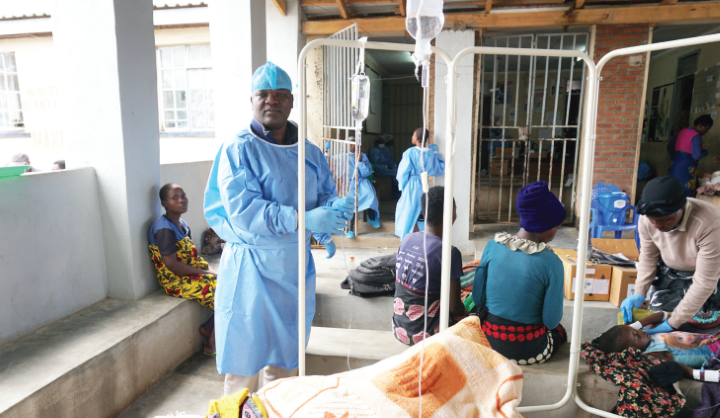Relieving Malawi’s disabled with ecosan latrines
 Until last year, Dyson Elisa, 57, had no reliable toilet. He kept on hiring people or asking his children to dig one every year.
Until last year, Dyson Elisa, 57, had no reliable toilet. He kept on hiring people or asking his children to dig one every year.
After constructing the latrine, Elisa’s sanitation woes were far from over as he had to struggle to get inside the toilet, let alone squat down because they were not built to cater for his walking disability.
Today, Elisa has a permanent latrine specially constructed to allow him get inside while on his wheel chair. He says he has now regained his dignity when answering the call of nature.
“Life was hard because all these years, I was unable to sit properly in the latrines. In most cases, I ended up touching some urine or faeces because it was difficult for me to help myself in a hygienic manner,†he says.
Elisa, who comes from Madzayenda Village in Traditional Authority (T/A) Tsabango, Lilongwe, suffered from cholera because of poor sanitation.
His sanitation woes ended when the Water Aid-funded Mineral and Appropriate Technology Applicable in Malawi (Matama) noted his suffering two years ago and helped to construct an ecosan (ecological friendly sanitation) latrine at his house together with a disability-friendly bathroom.
Matama water and sanitation facilitator Johnston Mhango says although they first gave Elisa a slab to construct a latrine at his house, he still struggled to use the toilet because of his disability.
“Later on, Water Aid came in and offered to construct a special ecosan latrine for him. This is part of our cause which is to ensure that people have good toilets in their households,†says Mhango.
He adds that Matama has helped to construct about 30 improved household pit latrines in several areas in T/A Tsabango for both people with disabilities and able-bodied persons.
He says one improved latrine, like Elisa’s, costs about K200 000 to construct, saying the communities contribute water and sand for the work. Ordinary latrines comprising a slab and a roofed structure with a door would cost between K20 000 and K50 000.
“Ecosan latrines are helping to eliminate cholera cases in villages. We advise the households to apply ash and sand after using the latrine. Ash helps to prevent bad smell and flies from coming out of the toilet.
“This year, we have had no cholera cases in the places we have constructed the latrines,†says Mhango.
Elisa and other beneficiaries of ecosan latrines are not only relieved of their sanitation problems but also anticipate to source manure from the latrines for their crops.
The latrines are constructed with two holes to allow harvesting of organic manure from one hole after about six to eight months from the time it is full.
Mhango says use of ash in the latrines helps to allow proper decomposition of the wastes to produce good manure.
Apart from Matama in Lilongwe, Water Aid is also working with other partners in districts like Machinga, Salima, Nkhotakota and Mzimba to construct ecosan latrines.
The latrines are not only constructed in individual households, but also primary schools where Water Aid is targeting to promote attendance and retention of disabled pupils in schools as some of them drop out due to poor sanitation facilities.
One of the schools that has benefited from Water Aid’s efforts to promote equity and inclusion in provision of sanitation facilities is Kamwendo Primary School in Machinga, where five disability friendly toilets have been constructed.
The school’s head teacher Johnson Misomali commended Water Aid for the development and says they expect to generate funds from the sale of the manure to be harvested from them.
“We have about seven pupils with disabilities at this school. In the past, they were struggling to use traditional latrines but now their lives have been made easier with the construction of these ecosan toilets,†says Misomali.
Besides, Water Aid is also supporting the construction of disability-friendly water points in Machinga villages through rehabilitation of the Namikomia-Chagwa Gravity Fed Water System.
The water points aim to ensure that people with disabilities and other excluded groups such as women and the elderly are able to easily use the facilities to access safe water.
Water Aid programme officer Lawrent Kumchenga says they decided to prioritise equity and inclusion in provision of water and sanitation facilities after noting that the rights of many disadvantaged groups were overlooked in construction of the facilities.
“Water Aid believes that access to sanitation and water is a right and cannot be taken away from you regardless of whether you have a disability or not,†he says.
With the prevailing high poverty levels in Malawi, ecosan latrines appear to be one of the most viable ways of effectively fighting diseases like cholera. The latrines would also sustainably complement efforts to reduce hunger as they can permanently provide manure for agricultural produce.





